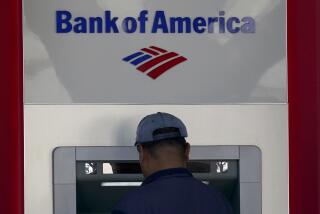Daiwa Pleads Guilty, Pays Record Fine to Settle Fraud Case
NEW YORK â Daiwa Bank Ltd. of Japan settled one of historyâs biggest bank fraud cases Wednesday, pleading guilty to an illicit cover-up of $1.1 billion in losses and paying a $340-million fine, a record for a U.S. criminal case.
The plea deal reached in Manhattan federal court ends a wrenching financial scandal that aggravated U.S.-Japanese relations and reflected what prosecutors called brazen disregard for U.S. laws by a foreign bank.
âBanks doing business in the United States must abide by the rules,â Atty. Gen. Janet Reno said in Washington. âThis record fine demonstrates that we take the rules seriously.â
The total amount ranks as the fourth-largest against a financial institution operating in the United States. In separate, previous cases, Drexel Burnham Lambert Inc. paid $650 million, BCCI paid $550 million and Prudential Securities paid $370 million. But those amounts included restitution money as well as fines. Reno called the Daiwa fine the largest ever in a U.S. criminal case.
At a hearing, U.S. District Judge Kimba Wood approved the agreement in which Daiwa pleaded guilty to 16 of the 24 original criminal counts, including numerous charges of fraud and deception in connection with the huge bond losses.
In exchange, the government dropped the remaining counts, including some charges related to Daiwaâs conduct before a 1991 federal law that stiffened regulation of foreign banks operating in the United States.
The government also agreed not to press further charges against Daiwa or Daiwa Bank Trust Co., its banking trust subsidiary.
âWe agreed to this settlement as the best business decision for our bank, its customers and its shareholders,â Daiwa President Takashi Kaiho said in a statement. âYears of future litigation would benefit no one. We accept responsibility for our actions.â
Daiwa, based in Osaka, is one of Japanâs biggest banks. It was accused by U.S. authorities in November of conniving with its former top New York bond trader to hide the extraordinary losses from bank regulators over a 12-year period.
Toshihide Iguchi, the trader, has pleaded guilty and accused Daiwa management of urging him to continue the cover-up after he confessed the losses to the bank in July.
Daiwa faced up to $1.3 billion in fines, or about four times the plea amount, if it had been found guilty at trial. The charges included obstructing examinations of its branches, making false statements to federal authorities and forging records.
The trial had been set to start April 15.
The bank âhas gotten itself rid of a huge albatross around its neck,â said Louis Begley, Daiwaâs lead lawyer in the case. âItâs relieved and happy.â
Early this month, Daiwa shut its U.S. operations in compliance with a government-ordered eviction from the United States as additional punishment for the scandal. To comply with the shutdown, the bank sold branches in 15 U.S. cities and most of its loans and related assets to Sumitomo Bank Ltd. for $3.37 billion.
A former general manager of Daiwa Bankâs New York branch, Masahiro Tsuda, also has been charged in the cover-up. Tsuda, who has pleaded innocent, has no intention of pleading guilty, said his lawyer, Stanley Arkin.
Daiwa and federal government lawyers reached a tentative deal Tuesday, shortly after the bankâs 18-member board in Japan gave its unanimous approval.
Daiwa agreed to the deal in part because it had no defense against some of the charges, including its failure to immediately report the loss to the Federal Reserve last summer, said sources familiar with the matter, speaking on condition of anonymity.
Daiwa also wanted to avoid the expense, length and negative publicity of a criminal trial in the United States and felt that it was getting off relatively cheap by paying $340 million, the sources said.
More to Read
Inside the business of entertainment
The Wide Shot brings you news, analysis and insights on everything from streaming wars to production â and what it all means for the future.
You may occasionally receive promotional content from the Los Angeles Times.










